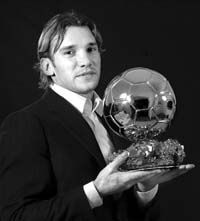Andriy Shevchenko, a.k.a Sheva, is the best soccer player, not just for his fans in Ukraine or Italy but in all of Europe. On December 13 he officially received the Golden Ball (photo), which is awarded annually by the magazine France Football to the best soccer player in the Old World. In a survey of leading sports magazines, Shevchenko scored 175 points, beating his closest rivals from Barcelona, the Portuguese Olivier Dacourt (139), and the Brazilian Ronaldinho (133). Before Andriy, the only two Ukrainian players ever to have achieved such prominence were Oleh Blokhin in 1975 and Ihor Bielanov in 1986.
At last! There is no better way to say it. It took him ten long years to win his prize, during which time he became a living legend of two clubs, Kyiv Dynamo and Italy’s Milan. In Dynamo, he changed from a young talent into the world’s most talented young forward. Playing for Dynamo, in 1994 he lost his first Champions League match against Bavaria, 1:4, but in 1997 he crushed the star-studded Barcelona 4:0 on its home pitch in one of the best matches of his life. By all accounts, he earned the Golden Ball back then, but didn’t receive it, perhaps because of his young age and the low standing of the Ukrainian national soccer championship. Then followed his fabulous $25 million transfer to the world soccer legend, FC Milan. Only the best players in the world join this club. It seemed that the shadow of the hallowed Marco Van Basten would hover above San Siro Stadium for decades to come, weighing heavily on all newcomers with its unchallenged authority. But Sheva refused to believe in spirits and scored 24 goals in his first season of the championship, earning the title of best striker of the club and Series A. Everyone is familiar with the statistics. What is more important, Andriy has become the First, but not only in the sense of being the best striker or proud owner of the Golden Ball, because these titles are only results. His excellence stems from the fact that he has broken the myth that a Slavic, or more precisely post-Soviet, mentality is incompatible with the Western mindset. He has proven that one of us can be the best, and not merely a here-today-gone-tomorrow star, in the Western world. But for this he had to work hard, both on and off the pitch. I remember the surprised looks of many people here on seeing Andriy in a televised interview, in which he spoke Italian after only six weeks in Italy. But it’s not only the language. Shevchenko managed to adapt very quickly and after only one year became a European to the backbone: fashionable, celebrated, and successful. He has taken part in fashion shows and befriended the most celebrated of fashion designers: “Well, buddy, I’m friends with Signor Armani.” This came as a culture shock to most of his Soviet-mentality countrymen. For this we must be grateful to him. For Andriy, the past year has been one of the best in his life. His wife bore him a son, Jordan. That day he spent a sleepless night in the maternity home and on the following day scored a victorious goal against Sampdoria in an important Series A match.
Did all of this earn him the Golden Ball? Probably not. After all, Andriy was selected as the best player exclusively for his performance. On the other hand, any success consists of many components: talent, hard work, and organic coexistence with the surrounding milieu. But Andriy has one more team with which he has yet to achieve noticeable results, namely, the national soccer team of Ukraine, known in the West as Shevchenko’s team. Now prospects don’t look bad for the team. It has the unrivaled holder of the Golden Ball, who is leading his partners. Their coach, Oleh Blokhin, is another holder of this trophy. This is a unique situation, and no other national team has anything of the kind. It’s time to take advantage of this unique opportunity.







